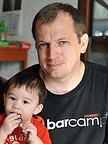 Benjamin Scherrey (@proteusguy) is a veteran of agile software development in Asia, through his work as Chief Architect atProteus Technologies, Bangkok. Fresh from Barcamp Singapore 5 last weekend, he kindly wrote to support JFDI.
Benjamin Scherrey (@proteusguy) is a veteran of agile software development in Asia, through his work as Chief Architect atProteus Technologies, Bangkok. Fresh from Barcamp Singapore 5 last weekend, he kindly wrote to support JFDI.
Singapore has a lot of promising talent with entrepreneurial spirit and a great environment to help a young business get started without having to fight the crushing bureaucracy present in the rest of Asia. What is lacking – at least anything that I have meaningful experience to recognize and address – is the availability of experienced design and development engineers and system architects with broad exposure to a wide range of technologies and processes needed to execute these business strategies effectively.
The primary reason for this deficiency has nothing to do with it’s size but is due, in great part, to the complete lack of a technical career path – an issue pandemic throughout Asia. The most brilliant minds in the country are only exposed to 3 – 5 years of real engineering experience before being promoted to administrative managers of other engineers, something they are entirely ill-suited for by the way, thus assuring that they will never have the opportunity to be exposed to enough engineering to ever grow into capable systems architects. While every country in Asia has a stated goal of creating its own local version of Silicon Valley, a primary missing attribute of the valley’s success has been universally ignored – the fact that engineers created and managed the most successful technology companies that we all hold as examples to emulate today. Unless engineering disciplines as career paths are elevated to the same level as business management, Asia will never live up to its potential for technology innovation.
JFDI is an excellent program that can help Singapore bootstrap its own engineering ecosystem. By bringing cross-functional teams of technical and non-technical talent together as collaborating colleagues, exposing them to Agile engineering disciplines, and demonstrating its fundamental impact on both the business and technology side of a tech startup, an appreciation for the need for such capabilities will grow for both the business managers and the young technical-leaning talent who might otherwise see no opportunity to pursue their real passion and therefore never realize their true potential. The exposure that these teams will receive in 100 days is greater than many local engineers may see in their entire careers. Each batch of JFDI program graduates, whether they exit with a new startup or not, will contribute to a newly available experienced talent pool which simply does not exist at this time. When concepts such as Agile, Test Driven Development and Continuous Integration become as ingrained into tech companies as double entry book keeping is for accountants or sterile room procedure for surgeons, Singapore will have the missing piece of the puzzle to be capable of launching world class technology ventures.

